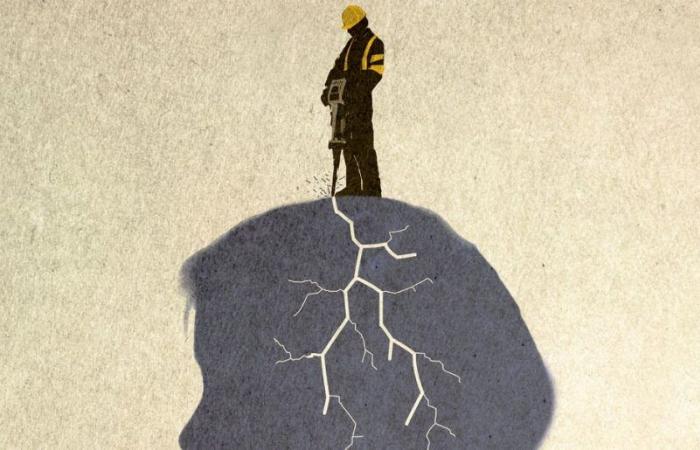The list of headache types is long. Sometimes short bursts of pain, sometimes attacks that last for hours. Then again on one side of your head, next time around your eyes or near your temples. Whatever type of headache you have, it can really get in your way. Where do those complaints come from? And what actually hurts?
Least research into what is most common
The ‘everyday’ tension headache is the most common. “But at the same time, we know the least about that,” says Rolf Fronczek, neurologist at the Leiden University Medical Center and specialized in headaches.
‘Not much research has been done into common headaches. People usually don’t go to the doctor about that.’ It is often a feeling of pressure above your eyes. The pain is not that intense. You take a paracetamol or you go to bed and it’s over the next day.
Tension headache
Any headaches that do not meet the criteria for other headaches, such as migraines and cluster headaches, are called tension headaches. These headaches have no clearly demonstrable cause in your brain. With tension headaches you actually only have a mild headache, which does not get worse when you exert yourself.
The name ‘tension headache’ is a bit unfortunate. “There is no scientific indication that these headaches have anything to do with too much muscle tension,” says Fronczek. ‘It has also not been proven that stress gives you a headache.’ It’s called a tension headache because it feels like there’s a tight band around your head. Unfortunately, it is not known what causes these headaches.
No pain in your brain
And what exactly hurts? Not your brain itself. There are no sensory nerve endings in your brain that can pick up a signal of pain and transmit it to the area in your brain that processes pain. If you were to stir your brain with a stick or cut out a piece of it, you wouldn’t feel anything.
But to get to your brain, you have to make a hole in your meninges between your skull and your brain. Those membranes are sensitive. ‘There are all kinds of nerve endings there,’ explains Fronczek. They mainly give their signals via the trigeminal nerve to your brain.
That specific nerve is also responsible for the feeling in your face. ‘If you have a headache, the nerves on your meninges are stimulated for some reason. You then feel pain.’ It is not known what causes this irritation in a standard headache.
Pulling on meninges
If you were to pull your meninges, it would hurt. Something like this happens, for example, if you have had too little to drink. Or drank too much the night before. Due to a lack of fluid, the brain can shrink slightly, and you will feel it: a headache. You have two of these nerves, one for the left and one for the right. That is why you sometimes have a headache on one side.
Migraines are more painful than regular headaches
After tension headache, migraine is the most common. About 12 percent of people suffer from migraines with some regularity. As many as 33 percent of women and 13 percent of men have ever had a migraine attack.
Such an attack lasts between one and three days and is usually more painful than a ‘normal’ headache. The pain is usually on one side of your head and you feel it throbbing or throbbing. If you exert yourself physically, the pain increases. You feel nauseous or even vomit. And you often have difficulty dealing with light and sounds.
Migraine comes from the Latin hemicrania, which means ‘pain on one side of the head’. The unstressed prefix ‘he-‘ has been dropped in French, from which we adopted the word.
Migraines are caused by too many nerve impulses
A little more is known about migraines. Fronczek: ‘We know that in migraine the nerve is disrupted and therefore hypersensitive. This is probably due to an inflammatory reaction in that nerve. That’s quite painful.
Inflammations are often caused by a bacteria or virus. But this is not the case with migraines, as your body causes the inflammatory response itself.’ But why does your body do that? Unfortunately, researchers don’t know that either.
Sex soothes the headache, even solo
If you have migraines, it might be worth a try. Researchers from the Westfälische Wilhelms-Universität Münster (Germany) discovered in 2013 that sex brings relief to some migraine patients. In sixty percent of patients it provided some relief or even made the pain disappear completely. Unfortunately, the pain only got worse for the rest.
It is not certain why having sex brings relief to some people and not to others. However, the researchers suspect that the endorphins which is released during sex and has an analgesic effect, soothing migraines. And some people release more endorphins during adventures between the sheets than others.
According to the German researchers, you do not have to have sex with a partner. Endorphins are released especially during the orgasm, so solo sex can also help.






